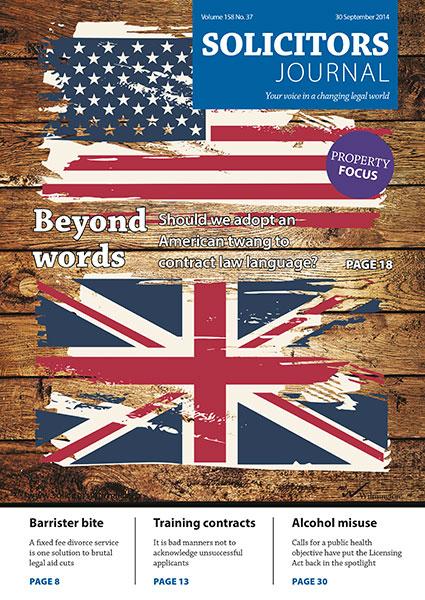[Updated October 14, 2014: Go here for a PDF copy.
Incidentally, I haven’t yet received any feedback about this article, but I’m not surprised. I wouldn’t have expected to hear from anyone who endorses the approach reflected in English caselaw, as I think I’ve comprehensively debunked it.]
The 30 September 2014 issue of the English periodical Solicitors Journal contains my article about use of the phrase best endeavours and its variants in English contracts. Here’s the teaser:
Treatment of the term ‘best endeavours’ and its variants shows that English judges and practitioners are interpreting contract language blindly, argues Kenneth Adams
Go here for the online version of the article. For the moment, it’s available only to registered users and subscribers, but you can register for a two-week free trial. In a bit I’ll make available a PDF version.
The article is featured on the cover, and you can see that the editors had some fun with it:
I wouldn’t be surprised if we hear from Disgusted of Tunbridge Wells …
The article isn’t as sweeping as the cover suggests, but I think that readers will find it a bracing bit of polemic. It’s appropriate that it come out just as I’m heading to London for my first in-house “Drafting Clearer Contracts” seminar in England, and on the eve of my 3 November public “Drafting Clearer Contracts” seminar at University College London (information here).


I suspect that “Disgusted, Tunbridge Wells” is a pen-name adopted by Mark Anderson’s partner Mr. Pettifog.
Mr Pettifog is currently undergoing a rest-cure at Leamington Spa, and it is highly unlikely that his medical team will allow him access to polemical articles.
Anent “Drafting Clearer Contracts”:
The Pareto principle (or 80–20 rule) states, generally and roughly, that 80% of effects come from 20% of causes. One application is that 80% of fees come from 20% of clients.
Query whether a drafter can get 80% of the benefit of MSCD by following 20% of its recommendations, and if so, which 20% are those?